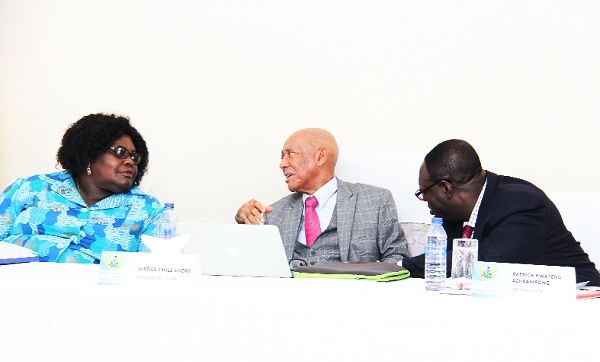
We can end the militias but…
“Injustice anywhere is a threat to justice everywhere. We are caught in an inescapable network of mutuality, tied in a single garment of destiny. Whatever affects one directly, affects all indirectly”-- Martin Luther King Jr.
Apart from the fact that this is one of my favourite quotes, the government has come under severe pressure to, as a matter of urgency, disband all identifiable militias springing up in the political circles of the country and if possible, make the forming of militias an unattractive business for its members, recruiters and sponsors.
This indicates that there is the general realisation of an imminent threat posed by vigilantism to the security architecture of the state.
In the month of February this year, the Police identified not less than 10 vigilantes associated with political parties, mostly the National Democratic Congress (NDC), the main opposition party and the New Patriotic Party (NPP), the incumbent party in government.
The Head of Faculty of Academic Affairs and Research at the Kofi Annan International Peacekeeping Training Center (KAIPTC), Dr Kwesi Aning, in his evidence before the commission also identified 24 of these groups.
We referred to them as political vigilantes until other names such as private militias and warlordism, emerged from the ongoing Ayawaso West Wuogon (AWW) Commission of Enquiry which I believe equally describes these groupings perfectly.
However, legislation in place will be well appreciated in providing a common terminology to describe the unlawful existence of these unions.
Positive
For the first time and for some reasons, I sense an end to this bane by the kind of passionate determination and firm declarations by leading personalities and institutions such as the President, the Inspector General of Police (IGP), the National Commission for Civic Education (NCCE), the academia, political activists, civil society groups, religious bodies and certainly the media as the drive.
This, to some extent, supports the adage that in every negativity, there is an element of positivism.
Frantic efforts in ending this nuisance have been witnessed after the AWW violence.
First was the setting up of a Commission of Inquiry with eminent composition.
As usual, some people initially criticised its membership, however, with barely three weeks gone, many are appreciating the wisdom behind its set up.
If your guess is as good as mine, many are in high expectation for the final report and, of course, its recommendations to shape our security sector.
Secondly, the let’s “mobilise to demobilise” call by the President during his state of the nation’s address is welcome.
If this is anything to go by, these unlawful groups were formed, empowered and resourced within political parties and it will not be out of place for these same parental shields to meet and decide on ways to disperse or annul the same power that created them. I salute our President for this move.
Thirdly, the absolute withdrawal of all forms of internal security details from the recent NDC presidential primary and entrusting the Police with all security arrangements needed for the polls is also commendable.
Let me state that, the power of the Police is derived from the Constitution, but its strength comes from the public. Whenever, the Police have the backing of the public, its high performance is naturally at its best.
Going forward, one of the achievements the people of Ghana wish to see from the commission is the total disbandment of all vigilante groups associated with political actors in words and deeds. However, I don’t think disbanding these groups alone is enough to safeguarding the security of citizens.
Disbanding
Apart from disbanding and criminalising the menace, these militia groups I believe have acquired some level of skills and training that better places them to serve the interest of their masters creditably, they may even have secrets that strengthen their allegiance to their political chiefs and vice versa.
Again, the groups have lived and fed their families on this same loyalty rewards irrespective of the amount they earned.
Disbandment will mean cutting of one’s livelihood or support networks, which may be difficult, but not impossible.
If they have to survive like we are all doing, then I suggest they are all identified, disarmed if necessary, profiled, and skills acquired over the years be channelled into other areas that will benefit society.
Ignoring these processes beyond disbandment is as good as equipping them to operate under their political actors.
If in the past they could easily be identified under a political master when critical, can we imagine the potential danger if they operate on their own with vicious ambitions as the driving force.
They must be helped to integrate socially and economically into the society, so that they can become active in the development processes of the country. The disbandment may be our priority now, but we must ensure that they do not re-unite on the basis of commonality against the state.
Well, since the time is always right to do what is right, as orated by Martin Luther King, the citizenry in the same vein must continue to speak out and support campaigns against vigilantism.
They must be disbanded, disarmed, integrated into the society by giving them credible alternative means of livelihood and monitored carefully.
The writer is the Public Relations Officer of the Accra Regional Police.
Writer’s E-mail: effiatenge@yahoo.com
